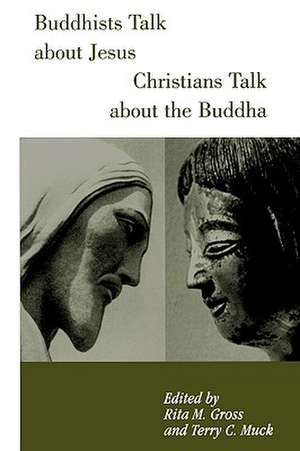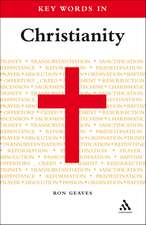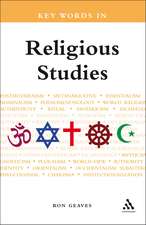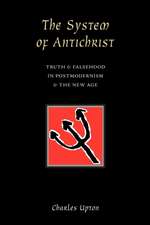Buddhists Talk About Jesus, Christians Talk About the Buddha
Editat de Rita M. Gross, Terry Mucken Limba Engleză Paperback – 31 ian 2002
Preț: 132.96 lei
Preț vechi: 221.22 lei
-40% Nou
Puncte Express: 199
Preț estimativ în valută:
25.44€ • 26.62$ • 21.13£
25.44€ • 26.62$ • 21.13£
Carte tipărită la comandă
Livrare economică 03-17 aprilie
Preluare comenzi: 021 569.72.76
Specificații
ISBN-13: 9780826411969
ISBN-10: 0826411967
Pagini: 160
Dimensiuni: 153 x 228 x 12 mm
Greutate: 0.26 kg
Editura: Bloomsbury Publishing
Colecția Continuum
Locul publicării:New York, United States
ISBN-10: 0826411967
Pagini: 160
Dimensiuni: 153 x 228 x 12 mm
Greutate: 0.26 kg
Editura: Bloomsbury Publishing
Colecția Continuum
Locul publicării:New York, United States
Recenzii
Originally a dedicated issue of a small, professorial journal, this set of essays has little of the musty academic's study about it. The scholarly contributors, six Buddhists and six Christians, speak personally to clearly convey the exceptions they take with either Jesus or the Buddha. The Buddhists' discomfort with Jesus arises from exclusive claims about him--that he is the unique Messiah, the unique personification of divinity, the unique facilitator of salvation. The deepest difference the Christian contributors have with the Buddha is over his stress on salvation by solitary effort, which they contrast with Jesus' invitation to salvation and promise of aid in achieving it. (John Dominic Crossan provocatively points out the class distinction between the well-born Buddha and the peasant-born Jesus. He also calls Christian exclusivity "implicitly genocidal.")
In a productive new approach to the Christian-Buddhist dialog, four religion scholars who practice Buddhism share their thoughts, both academic and personal, about Jesus followed by the reactions of two Christians. Likewise, four Christian "scholar-practitioners" comment on the Buddha followed by reactions from two Buddhist colleagues. Gross (Buddhism After Patriarchy) and Muck (religion, Austin Presbyterian Theological Seminary) have collected the essays, which originally appeared in the journal Buddhist-Christian Studies, and book-ended them with an introduction and closing essay. Thought-provoking enough for specialists, these articulate views from informed followers of the "other" faith are also accessible to general readers. This book is an excellent follow-up to Thich Nhat Hanh's Living Buddha, Living Christ (LJ 10/1/95) and the Dalai Lama's The Good Heart: A Buddhist Perspective on the Teachings of Jesus (LJ 7/96), which Muck discusses in the closing essay along with Kenneth Leong's The Zen Teachings of Jesus (Crossroad, 1995). Recommended for public and academic libraries.
Reminiscent of Thich Nhat Hanh and Daniel Berrigan's The Raft Is Not the Shore, this book brings together six Buddhists and six Christians for an interfaith conversation. Unlike that book, however, this one is eminently predictable, given the participants in the discussion: Buddhists chafe at declarations of Christian particularity, and the Christian interlocutors respond with eager disavowals of the traditional Christian claims about Jesus' uniqueness. They assert that "exclusivist" claims put forth by some Christians are not "intrinsic or necessary to Christianity"--which will come as no surprise once the reader notices that the first two Christian contributors are Marcus Borg and John Dominic Crossan. Had, say, Tom Bethel, Jan Karon, Frederica Mathewes-Green, or even Anne Lamott been invited to participate, the discussion might have gone a different route. As it stands, the book teaches us very little: we already knew Buddhists would be uncomfortable with assertions about Jesus being the only way, and we already knew that left-leaning Christians would rush to erase such assertions. This is fine as far as it goes, but many orthodox Christians will not find the tenor of the volume congenial. One is left wondering if there are no other Christian responses to the challenges of religious pluralism.
In a productive new approach to the Christian-Buddhist dialog, four religion scholars who practice Buddhism share their thoughts, both academic and personal, about Jesus followed by the reactions of two Christians. Likewise, four Christian "scholar-practitioners" comment on the Buddha followed by reactions from two Buddhist colleagues. Gross (Buddhism After Patriarchy) and Muck (religion, Austin Presbyterian Theological Seminary) have collected the essays, which originally appeared in the journal Buddhist-Christian Studies, and book-ended them with an introduction and closing essay. Thought-provoking enough for specialists, these articulate views from informed followers of the "other" faith are also accessible to general readers. This book is an excellent follow-up to Thich Nhat Hanh's Living Buddha, Living Christ (LJ 10/1/95) and the Dalai Lama's The Good Heart: A Buddhist Perspective on the Teachings of Jesus (LJ 7/96), which Muck discusses in the closing essay along with Kenneth Leong's The Zen Teachings of Jesus (Crossroad, 1995). Recommended for public and academic libraries.
Reminiscent of Thich Nhat Hanh and Daniel Berrigan's The Raft Is Not the Shore, this book brings together six Buddhists and six Christians for an interfaith conversation. Unlike that book, however, this one is eminently predictable, given the participants in the discussion: Buddhists chafe at declarations of Christian particularity, and the Christian interlocutors respond with eager disavowals of the traditional Christian claims about Jesus' uniqueness. They assert that "exclusivist" claims put forth by some Christians are not "intrinsic or necessary to Christianity"--which will come as no surprise once the reader notices that the first two Christian contributors are Marcus Borg and John Dominic Crossan. Had, say, Tom Bethel, Jan Karon, Frederica Mathewes-Green, or even Anne Lamott been invited to participate, the discussion might have gone a different route. As it stands, the book teaches us very little: we already knew Buddhists would be uncomfortable with assertions about Jesus being the only way, and we already knew that left-leaning Christians would rush to erase such assertions. This is fine as far as it goes, but many orthodox Christians will not find the tenor of the volume congenial. One is left wondering if there are no other Christian responses to the challenges of religious pluralism.













